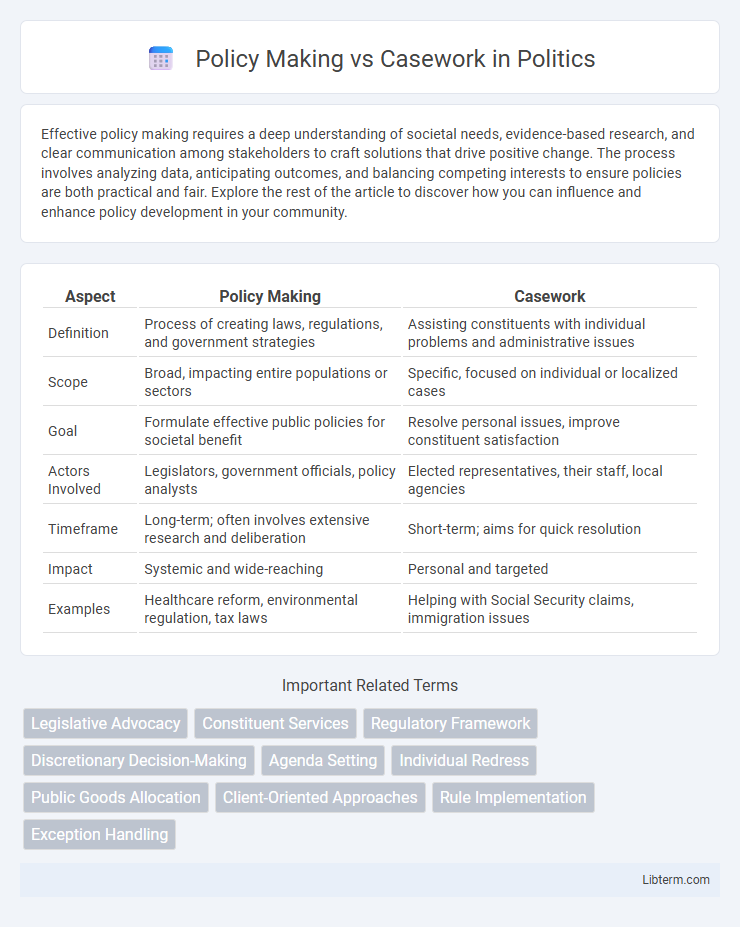Effective policy making requires a deep understanding of societal needs, evidence-based research, and clear communication among stakeholders to craft solutions that drive positive change. The process involves analyzing data, anticipating outcomes, and balancing competing interests to ensure policies are both practical and fair. Explore the rest of the article to discover how you can influence and enhance policy development in your community.
Table of Comparison
| Aspect | Policy Making | Casework |
|---|---|---|
| Definition | Process of creating laws, regulations, and government strategies | Assisting constituents with individual problems and administrative issues |
| Scope | Broad, impacting entire populations or sectors | Specific, focused on individual or localized cases |
| Goal | Formulate effective public policies for societal benefit | Resolve personal issues, improve constituent satisfaction |
| Actors Involved | Legislators, government officials, policy analysts | Elected representatives, their staff, local agencies |
| Timeframe | Long-term; often involves extensive research and deliberation | Short-term; aims for quick resolution |
| Impact | Systemic and wide-reaching | Personal and targeted |
| Examples | Healthcare reform, environmental regulation, tax laws | Helping with Social Security claims, immigration issues |
Understanding Policy Making: Definition and Scope
Policy making involves the systematic process of formulating, implementing, and evaluating public policies designed to address societal issues and guide governmental operations. Its scope encompasses analyzing complex social, economic, and political factors to develop comprehensive strategies that promote public welfare. Unlike casework, which addresses individual constituent concerns, policy making aims at broad, long-term solutions impacting entire communities or populations.
Casework Explained: Individualized Solutions
Casework involves providing personalized assistance to constituents by addressing their specific problems, such as navigating government services or resolving bureaucratic issues. Unlike broad policy making that targets systemic change, casework focuses on individualized solutions tailored to the unique circumstances of each person. This hands-on approach strengthens community relations and fosters direct impact through responsive problem-solving.
Key Differences Between Policy Making and Casework
Policy making involves developing broad regulations and strategic decisions that affect large populations, while casework focuses on resolving individual or localized constituent issues. Policymakers analyze data, forecast trends, and create legislative frameworks, whereas caseworkers provide direct assistance, navigate bureaucratic systems, and address specific problems faced by citizens. The key difference lies in scale and scope: policy making targets systemic change, casework ensures personalized support.
The Role of Government in Policy Making
The role of government in policy making revolves around formulating regulations that address public needs and promote social welfare. Governments analyze data, consult stakeholders, and draft laws to create frameworks that guide economic, social, and environmental outcomes. Effective policy making ensures structured governance and resource allocation, differentiating it from casework, which focuses on individual constituent services.
The Importance of Casework in Public Service
Casework plays a crucial role in public service by directly addressing the individual needs and concerns of citizens, ensuring government responsiveness and accountability. It helps public officials build trust with their constituents through personalized assistance and problem-solving, which often leads to more informed and effective policy decisions. Effective casework management enhances government transparency and strengthens community engagement, fostering a more inclusive democratic process.
Policy Making: Steps and Processes
Policy making involves a systematic process that begins with problem identification, followed by agenda-setting, formulation, adoption, implementation, and evaluation. Key steps include research and analysis to develop feasible policy options, stakeholder consultation to gather diverse inputs, and legislative or executive approval to formalize decisions. Effective policy making requires continuous monitoring and adjustment to ensure that goals are met and public needs are addressed efficiently.
Casework: Direct Impact on Constituents
Casework involves addressing individual concerns, resolving problems, and providing direct assistance to constituents, resulting in immediate and tangible benefits. It strengthens the relationship between elected officials and their communities by ensuring personalized support and responsiveness. Effective casework often leads to increased constituent satisfaction and trust in public representatives.
Challenges in Policy Making and Casework
Policy making faces challenges such as navigating complex stakeholder interests, balancing limited resources, and predicting long-term impacts in uncertain environments. Casework struggles with time constraints, managing high volumes of individual requests, and ensuring consistent, personalized support across diverse populations. Both processes require effective communication and data-driven decision-making to overcome these obstacles and deliver meaningful outcomes.
Integrating Policy Making with Effective Casework
Integrating policy making with effective casework enhances the responsiveness and impact of governance by ensuring that legislative decisions are grounded in real-world experiences and community needs. Casework provides policymakers with direct insights into individual and systemic challenges, enabling the formulation of targeted and practical policies that address specific issues. This synergy between policy frameworks and constituent services fosters more adaptive and inclusive governance, improving public trust and policy outcomes.
Policy Making vs Casework: Long-Term Effects and Outcomes
Policy making shapes broad legislative frameworks and institutional reforms that produce long-term societal impacts, influencing economic growth, public health, and social equity. Casework addresses individual constituent problems, providing immediate relief and personalized solutions without systemic change. The long-term effects of policy making create sustainable benefits by altering structural conditions, whereas casework outcomes tend to be short-term and localized.
Policy Making Infographic

 libterm.com
libterm.com